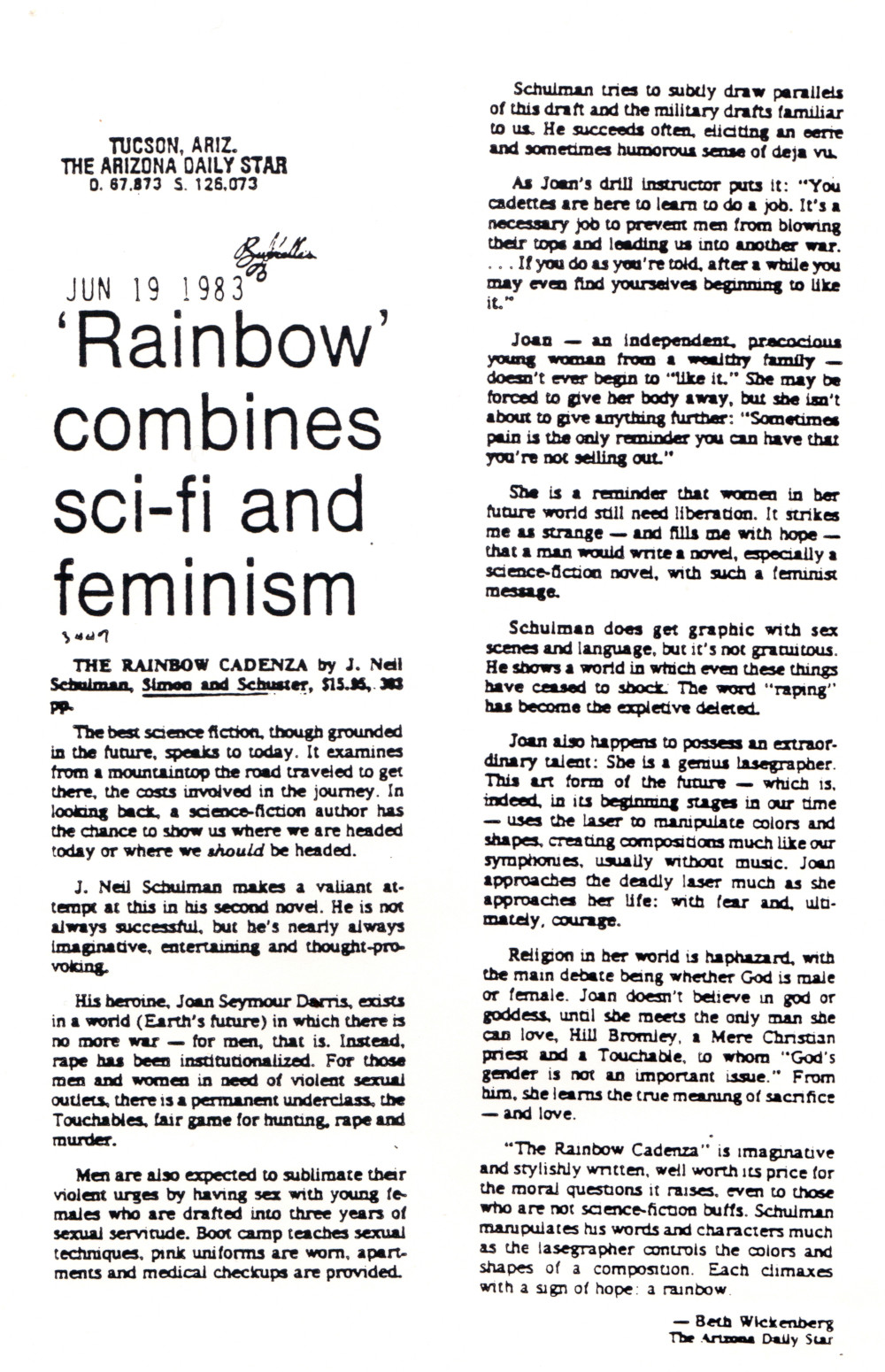Liberating Feminism
by J. Neil Schulman
[email protected]
Special to L. Neil Smith’s The Libertarian Enterprise
A person close to me who’s known me for decades recently criticized me for being critical of the slogan “We Believe Survivors!” and for backing off on my intitial support for Christine Blasey Ford’s believability. I was charged with attacking the women’s movement in general.
I agree with my critic that by unintended consequence my opposition could have been taken that way. I do, however, stress the word “unintended.”
To call myself a feminist is a semantic quagmire. First of all, the concept of a male feminist is metaphysically oxymoronic and understandable only if the word “feminist” is regarded either as a man’s personal attitude toward women’s status or as participation in a political movement.
Therein lies the problem. I’m primarily an individualist. I reject the political over the personal when the standard of the political left including political feminism has long been, “The personal is the political.”
How could I as an anarchist opposed to politics at its fundamental level ever agree with that premise? It’s the opposite of what I support, which is to whatever extent possible, replace the political with the personal.
My first impulse in anything I do either as an activist or as an artist is to take the individual person, and the individual case, as a reality, and anything “political” or “movement” as an intellectual abstraction removed from the real individuals or specific facts.
My critic saw my pulling back on my “believing” Christine Blasey Ford—because there was no forensic or witness corroboration of her accusation against Brett Kavanaugh—as a betrayal of the feminist “movement.” I had not intended it to be since in my view one particular case involving two individuals is not generalizable to all men accused of sexual assault or all women who are the victims of it. Nonetheless, if one’s mindset is looking at the status of women as a generalizable condition, I do see how the highest-profile specific case can be iconic, and Christine Blasey Ford and Brett Kavanaugh cease to be individuals but avatars for “men” and “women” in a sociological game ruled not by specific human relations but by overall games theory.
I’m not unfamiliar with games theory and the use of statistical models to analyze human interactions. It’s the base of the Austrian economics I’ve studied in pursuit of general libertarian strategy, and the base of that subset of sociology—criminology—I’ve studied in pursuit of the right to keep and bear arms. Value free—vertfrei, as Austrian-School writers called it—analysis has its place as a tool. But libertarianism, for me, has always been not an analytical set of procedures but a moral philosophy based on natural law.
It’s wrong, even unintentionally, for my writing to suggest women’s assault accusations should be disbelieved, even if the last thing that crossed my mind was that in discussing the wrong-headedness of a politicized movement—or a specific case—my words could be taken as an endorsement of “toxic masculinity.”
That phrase—“toxic masculinity”—is also political and is being attacked as cant by right-wingers. But if a term can be used in balance—and I’m not opening a discussion of countering that phrase with “toxic femininity,” a discussion for another time—then toxic masculinity can also be held as a reason why men suffering physical spousal abuse don’t make police reports because if one sign of failed “masculinity” is fear of being a “sissy,” then a husband being beaten up by his wife means it’s toxic for him to report it.
Just as “All lives matter” as a counter to “Black lives matter” is taken not at its face value as a pro-humanitarian statement but as a “dog whistle” for continued white supremacy over non-whites, “individualism” over “feminism” is not taken at its face value for universal rights but as a dog whistle for male supremacy.
I’ve spent my entire adult career making the case for individual rights. My 1983 novel The Rainbow Cadenza had female characters as both heroes and villains in a literal rape culture, but unlike the later-published The Handmaid’s Tale I was not making a specifically anti-male argument but a humanist one.
Nonetheless two afterwords to the 1986 Avon paperback edition were written by “individualist feminists” and one significant female reviewer of the novel wrote, “It strikes me as strange—and fills me with hope—that a man would write a novel, especially a science-fiction novel, with such a feminist message.”

Let there be no mistake about my position. I am first a believer in universal individual human rights.
Women are human beings, with all that implies.
Women and men must have absolute equality of opportunity in all cases and be judged in all cases according to their individual and real-world identities—their actual choices, specific abilities, and the content of their characters. This is not “identity politics”—a misnomer because all identity adheres not to arbitrary class collectives but only to actual real-world individuals—but it is the “politics” of individual identity.
I support any women’s movement that seeks all female individuals to be as honored, appreciated, and empowered to the same extent male individuals are.
The word of women making accusations of sexual assault must be taken seriously because often such a crime is—for authentic and logical reasons—unreported soon enough to be forensically examined. I maintain that however unfortunate it may be all accusations must be tested before an accused is concluded as guilty.
The two legal and moral principles in opposition produce no obvious legal solution to me that can be collectively applied in all cases.
This is not for me a gender issue but a human one, no anti-feminist dog whistle intended.
One of my mentors, Robert LeFevre, emphasized that it was far better to prevent a crime than seeking retributive justice after damage was done. That certainly applies to the violent crime of rape. I’ve often advocated for women to arm themselves as a technological means of overcoming superior male strength. Criminology finds that defensive gun use stops violent assault—particularly from multiple attackers—more effectively than other means.
But I will not disagree with sociological arguments about the utility of raising boys to be respectful of women—what in older times was called raising “gentlemen.” Gentlemen know to stop when a woman tells them to stop.
The other side of that is raising girls with the self-regard not to allow themselves to be abused. My grandparents raised my mother so that if her husband had ever raised a hand to her in violence even once, she would have left him.
My father never did, even once, and that lesson was passed along to me.
If in my absolute support for the Rights of Women to be free from violent assault I have been misunderstood to be saying anything otherwise, I hope this corrects the record.
>Reprinted from http://jneilschulman.agorist.com/2018/10/liberating-feminism/
© 2018 The J. Neil Schulman Living Trust. All rights reserved. Web and
email links with attribution permitted and encouraged. Other reprints
permitted only with prior permission of the author.

J. Neil Schulman is a novelist, screenwriter, journalist, radio
personality, filmmaker, composer, and actor. His dozen books include
the novels Alongside Night and The Rainbow Cadenza,
both of which won the Libertarian Futurist Society’s Prometheus
Award for best libertarian novel, and the anthology Nasty, Brutish,
And Short Stories.
Read
more about him.
Was that worth reading?
Then why not:
![]()
AFFILIATE/ADVERTISEMENT
This site may receive compensation if a product is purchased
through one of our partner or affiliate referral links. You
already know that, of course, but this is part of the FTC Disclosure
Policy
found here. (Warning: this is a 2,359,896-byte 53-page PDF file!)
